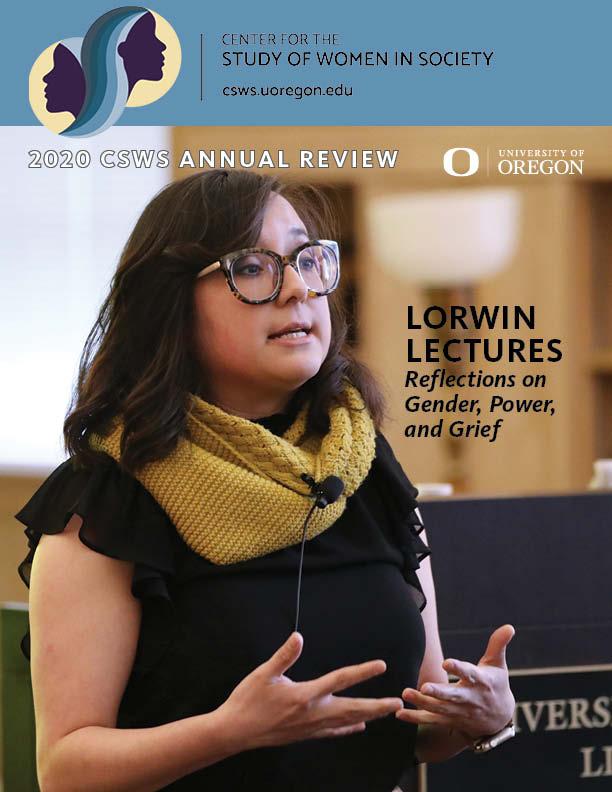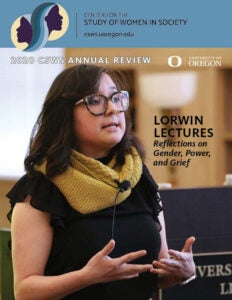
by Jenée Wilde, CSWS Research Dissemination Specialist
2020 has been an unprecedented year at CSWS and the University of Oregon. Not only has the COVID-19 pandemic curbed affiliate research and Center’s normal programming and operations, the murder of George Floyd ignited a summer of international racial justice protest movements and backlash. As a report on our activities during this momentous year, the 2020 Annual Review reflects the research and thinking of our grant award winners both before and after the coronavirus lockdown and protests over state-sanctioned police brutality
Director Michelle McKinley opens the issue with her annual report examining last year’s theme of “Gender, Power, and Grief” in light of our present circumstances and their effects on the Center and our community—including the premature ending of our Lorwin Lecture series and other talks scheduled for spring term. She also takes time to celebrate the achievements of our faculty and graduate student affiliates and the fierce feminist actions of our community to support caregivers.
Two feature stories in this issue delve deeper into the theme of “Gender, Power, and Grief.”
The first story, “Reflections on Gender, Power, and Grief,” offers personal commentary from four of our affiliates in response to Lorwin Lectures that took place in the fall and winter. In these reflections, introduced by McKinley, digital and editorial content editor Jessica T. Brown, School of Journalism and Communication, shares how she felt deeply affected by Rhaisa Williams’ Oct. 25 talk “Screaming to Dream: Toni Morrison, Emmett Till, and Black Maternal Grief.” Associate professor and director of the global health program Kristin Yarris, Global Studies, gives her take on Sylvanna Falcón’s Feb. 6 talk, “Finding ‘light born in darkness’: The Urgency of Feminist Activism in These Times.” Doctoral student Martha Ndakalako-Bannikov, Comparative Literature, shares her thoughts on Tina Campt’s inspiring Feb. 17 talk on “The New Black Gaze.” And doctoral student Jalen Thompson, English, explores how Karla Holloway’s Mar. 4 lecture “From Fact to Fiction: A Colored Life in Letters” impacted his thinking during a time of crisis for Black Americans.
In our second feature story, fiction author and career instructor Ulrick Casimir, English, conducts an in-depth interview with Karla Holloway, who was his teacher as an undergraduate student at North Carolina State University. Casimir talks to Holloway about her eighth book and debut novel, A Death in Harlem (2019). While this detective story was originally inspired by Nella Larsen’s classic novel Passing (1929), Holloway shares how the story and its characters took on a life of their own. The story follows protagonist Weldon Thomas, Harlem’s first and only “colored” policeman, as he picks through racial intrigue and thick layers of class, lies, and familial deceit to solve a murder mystery, while the author explores whose deaths really count in Black Harlem, and why.
Articles by two of our 2019 graduate student research grant award winners reflect on their projects’ significance during a time of social and political unrest and antiracist protests. In “‘Two Sides of the Same Story’: Colonial Violence and Erasure in the University of Oregon’s (Fallen) Pioneer Statues,” doctoral student Marc J. Carpenter, History, considers the legacy of UO’s Pioneer and Pioneer Mother monuments that inspired years of controversy, culminating with protesters toppling the two statues in June. Also, in “The Work of Black Feminist Liberation: Writing Erotic Freedom in Black Feminist Fiction and TV,” doctoral student Carmel Ohman discusses what it means to engage creative texts by and about Black women in this historic moment of collective action. Other reports from our 2019 graduate student research grand award winners include the following: Daizi Hazarika, Anthropology, “Witchcraft, Gender and Colonial Law in Assam, India: An Archival Analysis”; Jane Nam, Philosophy, “Escape the Corset: Radical Korean Feminism”; Amna Javed, Economics, “An Exploratory Analysis of Honor Killings in Pakistan”; and Emily Masucci, Anthropology, “The Politics of Seeking Shelter: Gender-based Violence and the Right to Safety Among Low-Income Women in Rio De Janeiro, Brazil.”
One of our faculty reports also connects her research on Black writing to the current crises. In her article, “The ‘Loophole of Retreat’: Seclusion, Privacy, and the Intimate Geographies of Black Life,” Assistant Professor Faith Barter, English, considers when seclusion, withdrawal, and retreat are not merely forms of confinement and isolation but are potential tools of Black survival—both in 19th-century Black writing and under today’s conditions of pandemic and state-sanctioned violence. Other faculty research reports include the following: Assistant Professor Diana Garvin, Romance Languages, “Feeding Fascism: Tabletop Politics in Italy, 1922-1945”; Associate Professor Kristin Yarris, Global Studies, “Mid-Century American Psychiatry and State Formation: A Post-Colonial Analysis of Morningside Hospital and the Alaska Mental Health Act”; and Professor Alisa Freedman, East Asian Languages and Literatures, “Learning Lives: Forgotten Stories of Japanese Women at American Universities in the 1950s and 1960s.”
You can access current and past issues of the Annual Review on the CSWS website: https://csws.uoregon.edu/publications/annual-report/

